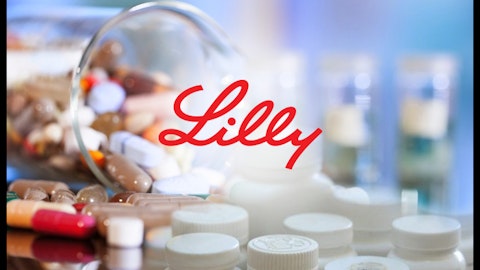DEVON Equity Management, an investment management firm, published its “Global Opportunities Fund” second quarter 2021 investor letter – a copy of which can be downloaded here. A portfolio return of 14.1% was recorded by the fund for the second half of 2021, while its benchmark by comparison returned 12.3% for the same period. You can view the fund’s top 5 holdings to have an idea about their top bets for 2021.
In the Q2 2021 investor letter of DEVON Equity Management, the fund mentioned Eli Lilly and Company (NYSE: LLY), and discussed its stance on the firm. Eli Lilly and Company is an Indianapolis, Indiana-based pharmaceutical company, that currently has a $255.9 billion market capitalization. LLY delivered a 58.12% return since the beginning of the year, extending its 12-month returns to 72.98%. The stock closed at $255.99 per share on August 03, 2021.
Here is what DEVON Equity Management has to say about Eli Lilly and Company in its Q2 2021 investor letter:
“In one of the most controversial moves in its long history, the US FDA approved Biogen’s (BIIB US) Alzheimer’s drug Aducanamab for commercial usage. The background is complicated and beyond the scope of this letter, but the controversy centres on both the interpretation of clinical trial data and the efficacy of the drug itself. The ultimate surprise came in June, when the FDA approved Aducanamab for commercial use with generous labelling (until at least 2030) in direct contradiction to the recommendation of the FDA’s own Advisory Committee of experts (AdCom), who in December 2020 voted against approval by 10 to 0 (with one abstention).
The decision caused a storm of criticism from clinicians and triggered a wave of resignations from members of the AdCom who had issued the original judgement (though ‘advisory’, the views of these expert panels typically carry enormous weight with the FDA).
Shortly after approving Aducanamab, the FDA offered breakthrough designation to Eli Lilly’s Alzheimer’s drug Donanemab, which published encouraging Phase II trail data in February 2021. Breakthrough Designation opens a path to accelerated approval based on the existing clinical trial data, whereas the expectation was for an additional 2-year Phase III clinical trial to be necessary before filing for commercial launch.
Whilst the FDA’s stance in favour of both drugs is highly controversial (especially Biogen’s Aducanamab), it reflects the scale of unmet need: Alzheimer’s has a huge global patient population and total lack of approved therapies.
The FDA’s accommodative stance towards these two drugs (both of which target the same ‘amyloid plaque’ clearance approach) is also likely to be motivated by the relatively mild side effects. From the perspective of most patients (and at least a certain cohort of physicians), a generally well-tolerated drug which might help slow the progression of such a debilitating disease represents a compelling proposition (and crucially favourable ‘risk/reward’).
Though Alzheimer’s is probably the biggest unmet clinical market (potential TAM in the tens of billions of dollars globally), considering the controversy around both the efficacy of these drugs and the approval mechanism the addressable market in the first instance will be a sub-segment of patients (almost certainly confined to the US).
Our core thesis on Eli Lilly rests on diabetes and obesity, where they represent one half of a quasi-duopoly (along with Novo Nordisk, the largest holding in Devon’s European Funds).
Given Lilly’s long, expensive, and largely unsuccessful history with Alzheimer’s drugs – prior to the Phase II data for Donanemab released in February we considered it an ‘option’ within an outstandingly strong drug discovery pipeline.”

Iakov Filimonov/Shutterstock.com
Based on our calculations, Eli Lilly and Company (NYSE: LLY) was not able to clinch a spot in our list of the 30 Most Popular Stocks Among Hedge Funds. LLY was in 55 hedge fund portfolios at the end of the first quarter of 2021, compared to 50 funds in the fourth quarter of 2020. Eli Lilly and Company (NYSE: LLY) delivered a 38.39% return in the past 3 months.
Hedge funds’ reputation as shrewd investors has been tarnished in the last decade as their hedged returns couldn’t keep up with the unhedged returns of the market indices. Our research has shown that hedge funds’ small-cap stock picks managed to beat the market by double digits annually between 1999 and 2016, but the margin of outperformance has been declining in recent years. Nevertheless, we were still able to identify in advance a select group of hedge fund holdings that outperformed the S&P 500 ETFs by 115 percentage points since March 2017 (see the details here). We were also able to identify in advance a select group of hedge fund holdings that underperformed the market by 10 percentage points annually between 2006 and 2017. Interestingly the margin of underperformance of these stocks has been increasing in recent years. Investors who are long the market and short these stocks would have returned more than 27% annually between 2015 and 2017. We have been tracking and sharing the list of these stocks since February 2017 in our quarterly newsletter.
At Insider Monkey, we scour multiple sources to uncover the next great investment idea. For example, pet market is growing at a 7% annual rate and is expected to reach $110 billion in 2021. So, we are checking out the 5 best stocks for animal lovers. We go through lists like the 10 best battery stocks to pick the next Tesla that will deliver a 10x return. Even though we recommend positions in only a tiny fraction of the companies we analyze, we check out as many stocks as we can. We read hedge fund investor letters and listen to stock pitches at hedge fund conferences. You can subscribe to our free daily newsletter on our homepage.
Disclosure: None. This article is originally published at Insider Monkey.





